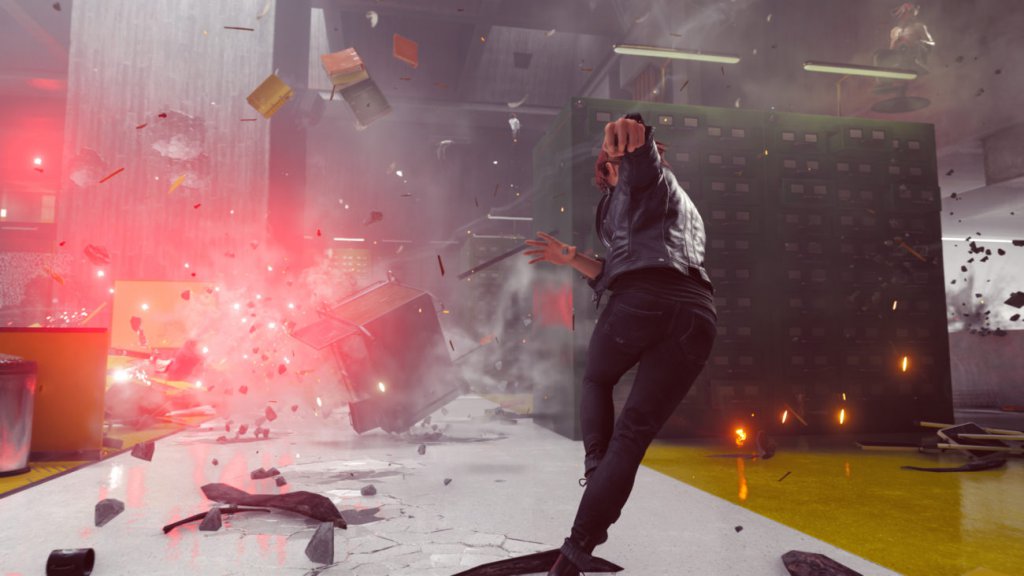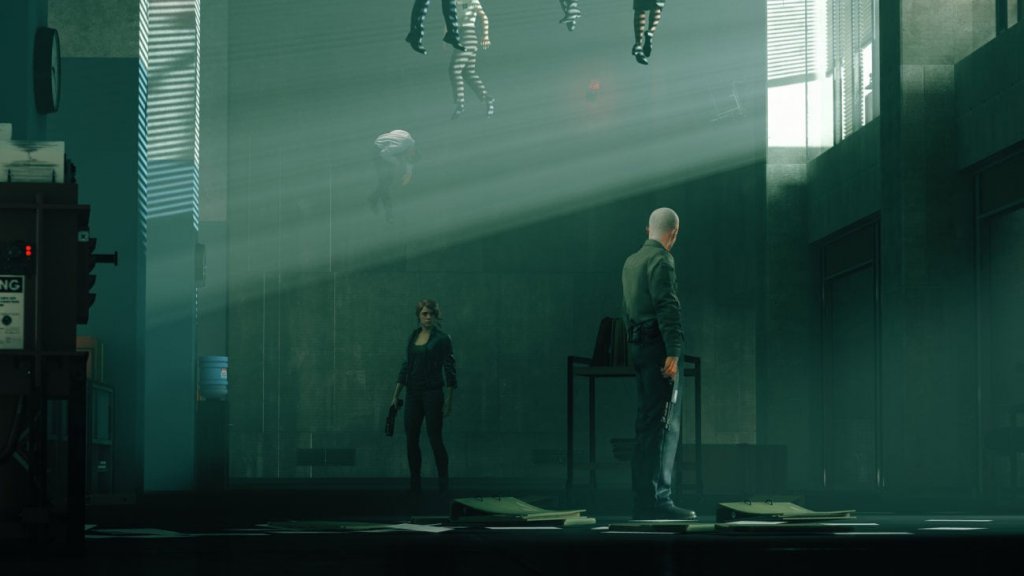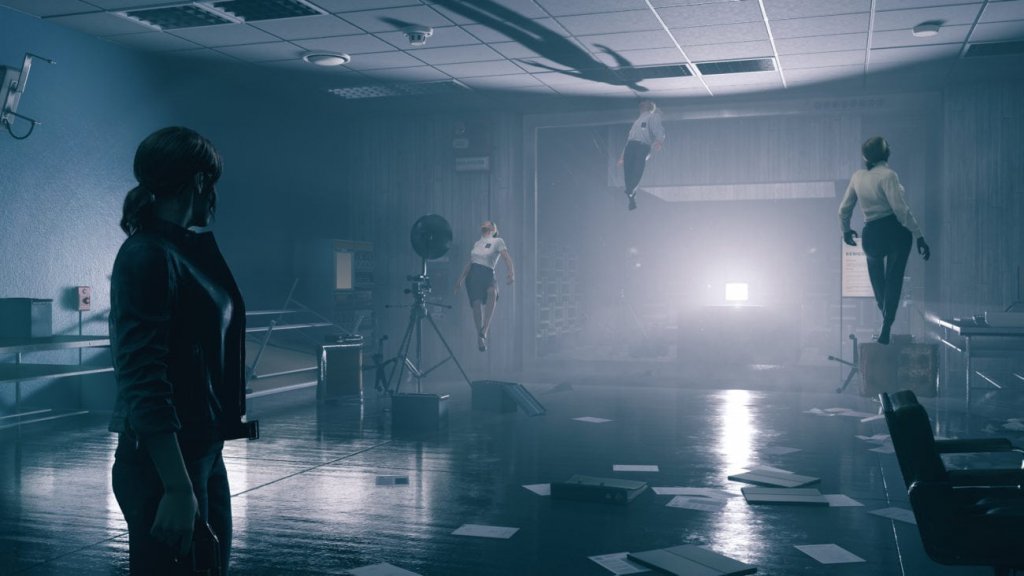Control — Fun with Faden
There must be something amazing in the water at Remedy Entertainment’s offices. To come up with something as intelligent, mind-bending, and ambitious as Control is no mean feat, and yet the Finnish developer makes it look so simple with its latest offering.
Control is Remedy’s most progressive game yet, and the manner in which it blends gameplay, sound and level design, and the plot serves as another example of the originality and ingenuity that makes Remedy one of the industry’s leading single-player game developers.
Control sees you take on the role of Jesse Faden, an individual imbued with superpowers after a traumatic childhood experience, who travels to the Federal Bureau of Control to get answers over her past. With this being a Remedy game, things aren’t normal from the get-go. Arriving at the clandestine government’s headquarters – The Oldest House – Jesse is mysteriously installed as the Bureau’s new Director and begins to unravel a potentially world-ending mystery brought about by an invisible enemy known as The Hiss.
At first glance, Control might seem like any other Remedy title. You traverse linear levels, have more questions than answers as to what’s going on, battle past a variety of enemies with tight gun gameplay mechanics, and feel a sense of unease about what could be lurking around the next corner. It’s a formula that’s worked well for Remedy in the past but one that even the development team felt had become a bit stale.
Control really begins to shine once you open up The Oldest House’s maze-like sectors. The linear familiarity makes way for a Metroidvania-inspired approach once you complete the game’s third mission, and it’s from here that you’re able to progress in any way you like. It’s a huge change for Remedy but one that pays off immensely. Side quests can be completed in any order, being unable to access certain areas – due to a lack of clearance level – means that you’ll always be backtracking to discover more secrets, and upgrading your abilities and gun to fit your own playstyle provides a level of customisation that hasn’t been there in previous Remedy games.
 Speaking of abilities and your gun, there’s a creativity to Control’s combat mechanics that make battles feel unique. Superpowers like Launch, Levitate, and Dash aren’t new, but how you marry them with your gun — the Service Weapon — is. Your ability bar can be depleted quickly if you overuse them, so using them alongside your Service Weapon is key to staying alive.
Speaking of abilities and your gun, there’s a creativity to Control’s combat mechanics that make battles feel unique. Superpowers like Launch, Levitate, and Dash aren’t new, but how you marry them with your gun — the Service Weapon — is. Your ability bar can be depleted quickly if you overuse them, so using them alongside your Service Weapon is key to staying alive.
The Service Weapon itself is a cool piece of technology. Instead of forcing you to carry five or six different weapons, the Service Weapon has a variety of forms that you can switch between. Grip is your standard pistol weapon, and is your starting Service Weapon form once you acquire it. There are other modes like Shatter and Pierce – your shotgun and sniper rifle derivatives – but you need to acquire materials to unlock these and other weapon types. You’re also only allowed to pick two forms to use at any one time. Control’s flexibility lets you try out each type and pick the two that are best suited to how you play, but they all use the same rechargeable ammo resource. Again, this plays into the need to combine your gun and abilities during combat, and ensures you don’t overly rely on one or the other.
 Your abilities and Service Weapon can be upgraded and modified to become more powerful, and you’ll need to make each one stronger as you progress through Control. Make no mistake, Control is Remedy’s toughest game to date. There’s no option to change difficulties – a blot on the game as some might find the game’s only difficulty mode challenging and frustrating – and the variety of enemies have no worries in flanking you, seeking you out behind cover, and letting you recuperate health. It means that you have to stay on the move as standing still, even for a few seconds, isn’t wise.
Your abilities and Service Weapon can be upgraded and modified to become more powerful, and you’ll need to make each one stronger as you progress through Control. Make no mistake, Control is Remedy’s toughest game to date. There’s no option to change difficulties – a blot on the game as some might find the game’s only difficulty mode challenging and frustrating – and the variety of enemies have no worries in flanking you, seeking you out behind cover, and letting you recuperate health. It means that you have to stay on the move as standing still, even for a few seconds, isn’t wise.
There’s no automatic health recovery mechanic here either. You refill your health bar by picking up health shards dropped by enemies, so don’t think you can hide and wait for your health to recuperate. You’re forced to engage enemies to get health back, and these rush mechanics force you to stay on the offensive. It provides a risk-reward system that’s both satisfying and daunting, especially in later missions when enemies are extremely tough.
 It isn’t just winning firefights where you are rewarded with health and item drops. Exploring every corner of The Oldest House’s many sectors can give you more insight into the Bureau’s history via collectibles. You’ll also come across optional side quests that might give you a new ability, or find chests with new materials to unlock a new Service Weapon mode. Exploration is rewarded, and making yourself more powerful as you unravel The Bureau’s secrets, The Hiss’ motivations, and Jesse’s backstory constantly make it feel like you’re progressing throughout Control.
It isn’t just winning firefights where you are rewarded with health and item drops. Exploring every corner of The Oldest House’s many sectors can give you more insight into the Bureau’s history via collectibles. You’ll also come across optional side quests that might give you a new ability, or find chests with new materials to unlock a new Service Weapon mode. Exploration is rewarded, and making yourself more powerful as you unravel The Bureau’s secrets, The Hiss’ motivations, and Jesse’s backstory constantly make it feel like you’re progressing throughout Control.
Control is by no means perfect. Exiting the menus on multiple occasions led to jarring or stuttering gameplay for a few seconds. Game crashes are few and far between but, when they do occur, it means that some progress can be lost if the game’s autosave function doesn’t kick in properly. Some of the cutscenes also feel clunky. Animations are samey, especially the ones where Jesse and Bureau research scientist Emily Pope are discussing plans of action in between missions, and it doesn’t feel natural to see the duo make the same movements in their chairs ad infinitum.
 Constantly spawning enemies are a bit of a drag too. Sure, it makes sense for The Hiss to re-emerge in areas you’ve already visited. They’re far reaching and, coupled with side quests called Board Countermeasures and Bureau Alerts where you have to remove The Hiss from specific areas, it’s a necessity for Control to continually spawn them. However, when you’re wanting to explore a previously discovered area for secrets, or simply heading back to chat to Emily, having to fight off new waves blocking your path can be frustrating.
Constantly spawning enemies are a bit of a drag too. Sure, it makes sense for The Hiss to re-emerge in areas you’ve already visited. They’re far reaching and, coupled with side quests called Board Countermeasures and Bureau Alerts where you have to remove The Hiss from specific areas, it’s a necessity for Control to continually spawn them. However, when you’re wanting to explore a previously discovered area for secrets, or simply heading back to chat to Emily, having to fight off new waves blocking your path can be frustrating.
Control is Remedy’s finest game to date though. It might start off a bit slow for some but, once it gets going, it really does shine. Control’s intriguing plot is what ultimately drives it, but there’s so much more beneath the surface that sets it out as a joy to play. Remedy’s dry humour is on display within The Oldest House’s collectibles, posters, and post-it notes. The sound design is mesmeric and unsettling, and there’s even music-related Easter Eggs that will have long-time Remedy fans grinning if you’re able to find them.
As a game, Control isn’t an industry game-changer. It’s a bigger, bolder, and fresher experience from Remedy though, and one that adds another string to their bow. It’s easy to lose hours within The Oldest House, but that’s a mark of a good game. The saying goes “time flies when you’re having fun” and, with Control, I had tons of fun.
Control is available from the 27th of August on PC (via the Epic Store), Xbox One and PS4.

Comments are closed.